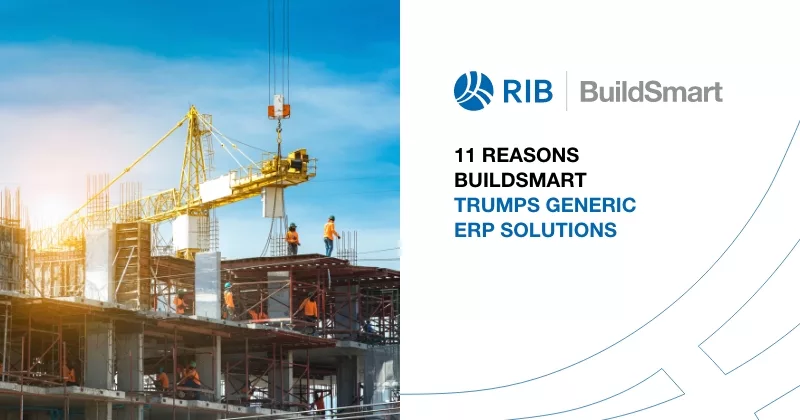22 mins read
Implementing ERP In The Construction Industry

| Construction ERP |
ERP systems have been widely used across all business sectors but none have recognized the need for investing in technological investment for sustainable growth more than the construction industry. The absolute necessity for improved efficiency, transparency of process and long-term cost management and control are recognized as pivotal factors in remaining at the pinnacle of the market in a sector that is fiercely competitive and operating on significant scale of investment and profit. If you are in the construction industry and considering investing in an enterprise planning solution (ERP), this article will give you significant strategic insight in what you need to know. Keep reading to learn about implementing ERP in the construction industry.
Power(ful) Tools for Contractors
Can you have too many resources and tools that positively impact your business? One of the core benefits of Construction ERP is the wide range of features designed specifically for contractors and contract management. A comprehensive ERP will provide elements such as:
- Procurement and controls
- Specialised Cost Ledgers
- Payroll and Labour Costing
- Plant and Equipment Costing
- Contract Cost Reporting
- Business Intelligence
- Document Management
- Time and Attendance Systems
- Human Resource Management
- Enterprise Accounting
When evaluating your potential solution, you will need to understand how the functions will integrate and benefit you but there are 3 core elements that you must ensure are provided.
The 3 Core Elements your Construction ERP Must Have
- Contract management. Traditional ERP systems are product based whereas a construction ERP must be focused on Capital Assets contract management. The peculiar challenge for a construction ERP is on managing a scope of work that can be fluid relating to a complex asset. Contract management needs to allow for multiple changes (sometimes hundreds of changes from initial design) and be structured to handle workflow approvals, contract changes and revisions.
- Valuations within contract management. Unlike product based systems where there will often be a defined cost base, the construction industry needs to measure and account for work completed (Valuations). This is commonly done on a progressive monthly pattern and forms the basis for payments being received or remitted to sub-contractors. These valuations are often submitted by the Quantity Surveyor (physical measurement against the bill of quantity) and used to form the basis of applications for payment submitted to the client.
- Cost control.The complexity of cost control in construction goes far beyond the abilities of a traditional ERP. A construction ERP must be able to handle such diverse elements as resource allocation (internal and external), payments on milestones, sub-contractor costs and plant and equipment. The ability to set a budget for the project as a whole and adapt to changes are key in addition to the ability to provide scheduled and up to date reports, business intelligence and revision of the project forecast based on actual spend. This will assist on maintaining control of costs and, of course, margin.
In reality, a true, tried and tested ERP designed for the Construction Industry will do all of these and much more. Explore the options available and take guidance from the industry leaders in the field who have already adopted these systems and benefits and let technology provide the additional support and efficiencies that are available. Implementing ERP in the construction industry doesn’t have to be a struggle when you partner with an industry leader.
Want to know how to get the best ROI from Construction ERP Software?
See this in action ” CCS Case Study – Petroserv“
Most Recent
22 mins read
22 mins read
15 mins read
49 mins read

E-BOOK











